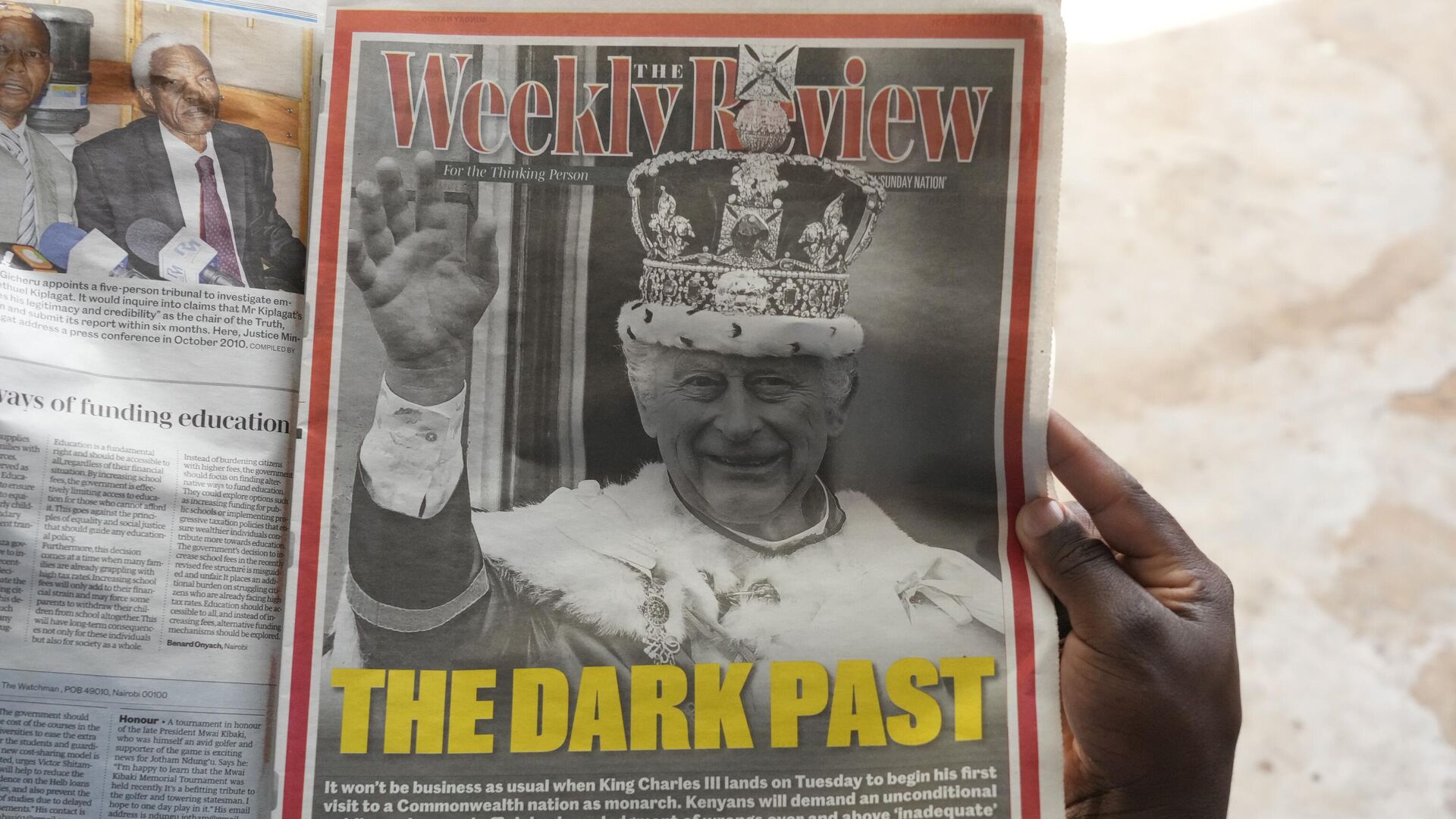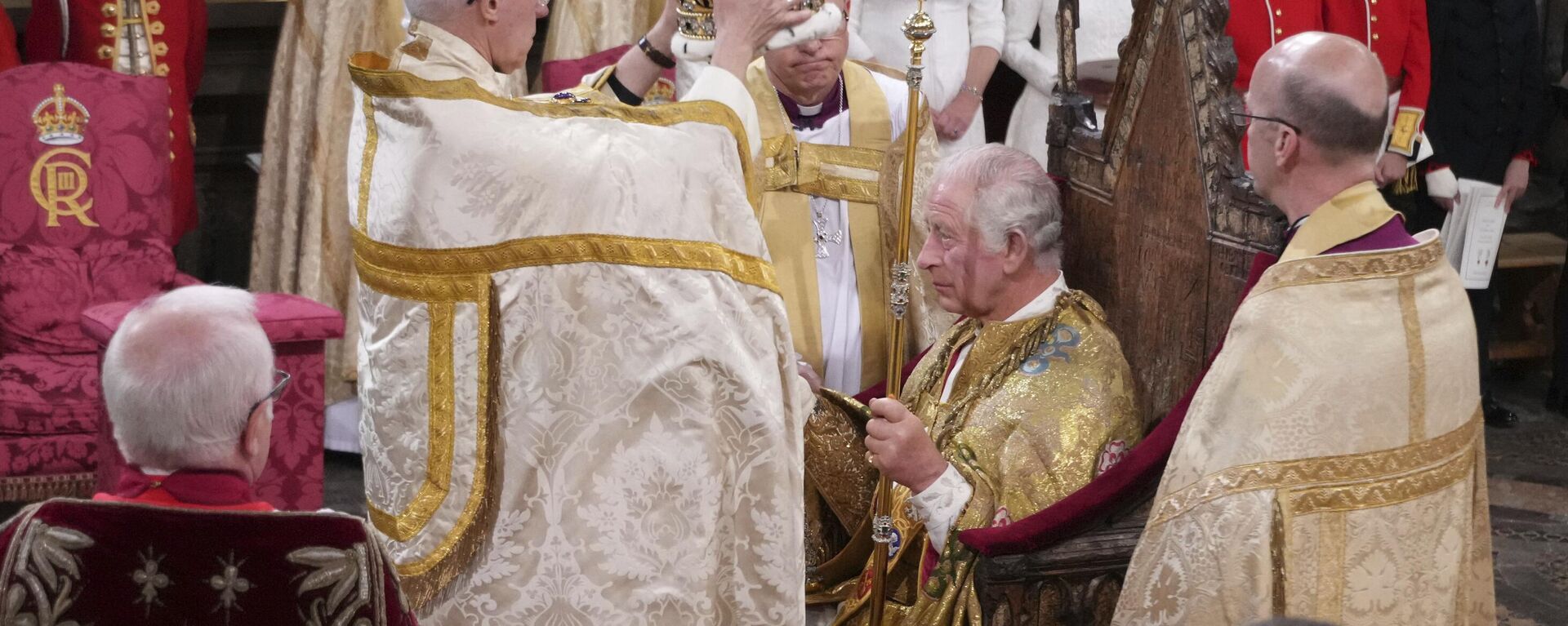https://en.sputniknews.africa/20231030/uk-never-intended-to-get-rid-of-its-colonial-legacy-prof-on-uk-kenya-controversial-ties--1063195105.html
'UK Never Intended to Get Rid of Its Colonial Legacy': Prof on UK-Kenya Controversial Ties
'UK Never Intended to Get Rid of Its Colonial Legacy': Prof on UK-Kenya Controversial Ties
Sputnik Africa
British monarch Charles III and his wife Camilla will begin a four-day visit to Kenya on Tuesday, the king's first visit to a Commonwealth country since his... 30.10.2023, Sputnik Africa
2023-10-30T16:57+0100
2023-10-30T16:57+0100
2023-10-30T16:57+0100
opinion
kenya
east africa
africa insight
king charles iii
united kingdom (uk)
neocolonialism
visits
independence
british commonwealth
https://cdn1.img.sputniknews.africa/img/07e7/0a/1e/1063199645_0:160:3072:1888_1920x0_80_0_0_dba58cf10f3a8aae06af368b139972c0.jpg
The United Kingdom has never sought to end the colonial legacy in Kenya and has never withdrawn from the East African nation because of the investment it has made there, Macharia Munene, Professor of History and International Relations at the US International University in Kenya's Nairobi, told Sputnik Africa.According to the professor, the royal family has personal interests in Kenya, such as a lot of real estate, as well as other types of engagements that "date back to the colonial days."Regarding the military, the expert noted that there are cases where there is friction between London and Nairobi because the UK soldiers leave live ammunition behind, which then explodes at an inconvenient moment.Despite this, Munene claimed that Kenya has no animosity towards the British as such, except when the UK interferes in politics and tries to impose its way and force Kenyans to agree with them.In the context of Kenya-UK relations, the expert also recalled the "traumatizing events" of 1952-1960, the Mau Mau rebellion against the British colonial government. According to him, Kenyans still remember the tragic events as Hola massacre committed by British colonial forces in 1959, arresting six leading Kenyan nationalists (The Kapenguria Six), but "the whole episode is remembered as having fought independence in Kenya from the British."According to the professor, in Kenya today, there are many thousands of families with similar "harrowing" stories of the tragic events of the rebellion.Munene added that there had long been attempts in post-colonial Kenya to downplay the Mau Mau "in order to conform to official British thinking," a situation that has only begun to change in recent months and years.King Charles' Visit Commenting on King Charles' upcoming visit to Kenya, the expert noted that his goal is not to apologize to the Kenyan people.Meanwhile, the analyst suggested that the visit may raise the issue of returning archival documents and artifacts from the UK to Kenya that were taken by British officials.As for Kenyans' public opinion on the monarch's visit, the professor said it was "mixed" and "there are no big emotional attachments." He also called the event "amusing" for ordinary people.On Sunday, the Kenya Human Rights Commission called on Charles to make a "clear and public apology" and pay reparations for abuses committed by colonial authorities.Ten years ago, the British government acknowledged the use of torture in Kenya by the colonial administration and agreed to pay compensation to victims. In the summer of 2022, a group of Kenyan citizens from the Talai and Kipsigis communities sued the United Kingdom in the European Court of Human Rights, seeking $200 billion in compensation for the harm they and their ancestors suffered under British colonial rule. The lawsuit alleges that members of the two communities were evicted from their land in the late 19th century, which was then given to tea companies.On October 11, Buckingham Palace announced Charles III's upcoming visit to Kenya, noting that the monarch would pay due attention to "the more painful aspects" of the UK's shared history with Kenya, including the response to the Mau Mau anti-colonial rebellion.
https://en.sputniknews.africa/20230917/1062179632.html
https://en.sputniknews.africa/20230507/colonial-legacy-african-netizens-slam-coronation-of-uks-charles-iii-1059098584.html
kenya
east africa
united kingdom (uk)
Sputnik Africa
feedback@sputniknews.com
+74956456601
MIA „Rossiya Segodnya“
2023
Maxim Grishenkin
https://cdn1.img.sputniknews.africa/img/07e7/0a/17/1063018107_0:0:1104:1103_100x100_80_0_0_03090c85a11f5d2e8a19cf1d989443c9.jpg
Maxim Grishenkin
https://cdn1.img.sputniknews.africa/img/07e7/0a/17/1063018107_0:0:1104:1103_100x100_80_0_0_03090c85a11f5d2e8a19cf1d989443c9.jpg
News
en_EN
Sputnik Africa
feedback@sputniknews.com
+74956456601
MIA „Rossiya Segodnya“
Sputnik Africa
feedback@sputniknews.com
+74956456601
MIA „Rossiya Segodnya“
Maxim Grishenkin
https://cdn1.img.sputniknews.africa/img/07e7/0a/17/1063018107_0:0:1104:1103_100x100_80_0_0_03090c85a11f5d2e8a19cf1d989443c9.jpg
kenya, east africa, africa insight, king charles iii, united kingdom (uk), neocolonialism, visits, independence, british commonwealth
kenya, east africa, africa insight, king charles iii, united kingdom (uk), neocolonialism, visits, independence, british commonwealth
'UK Never Intended to Get Rid of Its Colonial Legacy': Prof on UK-Kenya Controversial Ties
Longread
British monarch Charles III and his wife Camilla will begin a four-day visit to Kenya on Tuesday, the king's first visit to a Commonwealth country since his coronation. Sputnik Africa sat down with an expert to reflect on the historic nature of the relationship between the two countries.
The United Kingdom has never sought to end the colonial legacy in Kenya and has never withdrawn from the East African nation because of the investment it has made there, Macharia Munene, Professor of History and International Relations at the US International University in Kenya's Nairobi, told Sputnik Africa.
According to the professor, the royal family has personal interests in Kenya, such as a lot of real estate, as well as other types of engagements that "date back to the colonial days."
"It [the UK] never intended to get rid of its colonial legacy. The UK never really left because it has a lot of investments," Munene opined. "The royal family owns a lot of land in Kenya and other properties, conservancies and people have a soft spot for British things. The British military trains in Kenya, the BATUK [The British Army Training Unit Kenya], the areas of Marsabit, Isiolo, Laikipia."
Regarding the military, the expert noted that there are cases where there is friction between London and Nairobi because the UK soldiers leave live ammunition behind, which then explodes at an inconvenient moment.
Moreover, in 2021, a devastating fire that broke out during a British military exercise in Kenya ravaged more than 4,800 hectares (12,000 acres) of land. A Kenyan court ordered the British Army to pay compensation for the fire, but victims complain that there is none.
Despite this, Munene claimed that Kenya has no animosity towards the British as such, except when the UK interferes in politics and tries to impose its way and force Kenyans to agree with them.
"Sometimes they [Kenyans] don't agree. But the neocolonial relationship has been continuous. So neo-colonialism has been a long lasting reality in Kenya, and sometimes it appeared as if the leaders did not mind that image of Kenya being a neo-colonial state," the analyst explained.
In the context of Kenya-UK relations, the expert also recalled the "traumatizing events" of 1952-1960, the Mau Mau rebellion against the British colonial government. According to him, Kenyans still remember the tragic events as Hola massacre committed by British colonial forces in 1959, arresting six leading Kenyan nationalists (The Kapenguria Six), but "the whole episode is remembered as having fought independence in Kenya from the British."
Munene told Sputnik Africa a story from his family. His father was a prisoner during the Mau Mau rebellion and lost his teeth after being beaten by a white officer for refusing to say that Jomo Kenyatta (one of the Kapenguria Six, an anti-colonial activist who later became Kenya's first prime minister) was a bad man.
According to the professor, in Kenya today, there are many thousands of families with similar "harrowing" stories of the tragic events of the rebellion.
Munene added that there had long been attempts in post-colonial Kenya to downplay the Mau Mau "in order to conform to official British thinking," a situation that has only begun to change in recent months and years.
Commenting on King Charles' upcoming visit to Kenya, the expert noted that his goal is not to apologize to the Kenyan people.
"Charles is coming for a sentimental reason. He's not coming here to apologize. Yes, he might acknowledge, 'Yeah, we've made mistakes here and there. And yes, we've beaten up a few people here and there,' but the essence of his visit is not to apologize," Munene remarked.
Meanwhile, the analyst suggested that the visit may raise the issue of returning archival
documents and artifacts from the UK to Kenya that were taken by British officials.
"There were artifacts, sometimes some of them being shrines and things of value to particular peoples in Kenya and they were taken away. Some of them are in various museums, like the Pitt Museum is said to have quite a few things. And so there is discussion. Can you return these things to us? They mean more to our people than they mean to you," Munene said.
As for Kenyans' public opinion on the monarch's visit, the professor said it was "mixed" and "there are no big emotional attachments." He also called the event "amusing" for ordinary people.
"Although officially, the British colonial rule left in 1963-1964, institutions and their legacies, attachments remained at personal level and also as a source of interest to a number of people but not to be concerned with a lot of people," Munene concluded.
On Sunday, the Kenya Human Rights Commission
called on Charles to make a "clear and public apology" and pay reparations for abuses committed by colonial authorities.
Ten years ago, the British government acknowledged the use of torture in Kenya by the colonial administration and agreed to pay compensation to victims.
In the summer of 2022, a group of Kenyan citizens from the Talai and Kipsigis communities sued the
United Kingdom in the European Court of Human Rights, seeking $200 billion in compensation for the harm they and their ancestors suffered under British colonial rule. The lawsuit alleges that members of the two communities were evicted from their land in the late 19th century, which was then given to tea companies.
On October 11, Buckingham Palace announced Charles III's upcoming visit to Kenya, noting that the monarch would pay due attention to "the more painful aspects" of the UK's shared history with Kenya, including the response to the Mau Mau anti-colonial rebellion.




